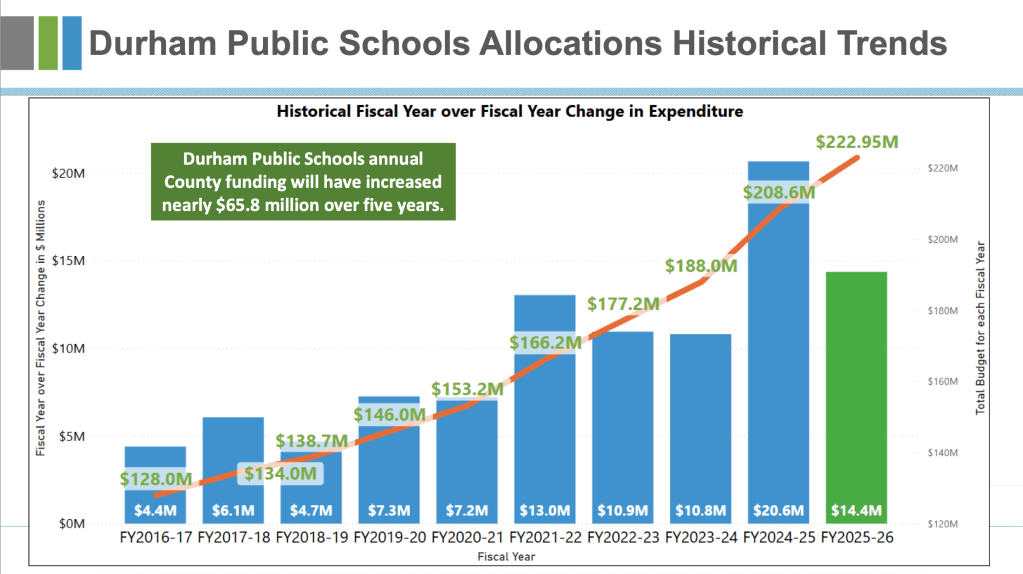On Monday night, Durham County Manager Claudia Hager presented her proposed budget for the 2025-26 fiscal year.
The recommended Durham County budget totals $1.04 billion, a $71.55 million, or 7.4 percent, increase from last year. Hager said the additional funding prioritizes education, public safety, and personnel compensation.
Property tax revenue, the county’s main source of revenue, is expected to jump nearly $48 million. That’s because, in January, new property valuations went into effect for Durham County property owners. This year, higher property values and a growing population of taxpayers resulted in a $85.8 billion, or 60.3 percent property value increase across the county compared with the last valuation in 2019.
To offset the spike in property values, the county manager suggested lowering the tax rate from the current rate of 79 cents per $100 to “revenue neutral” at 51.92 cents per $100 before tacking on an additional 3.5 percent, setting the county-wide tax rate at 55.42 cents per $100. Essentially, Hager is proposing a major cut to the property tax rate next fiscal year, but because property values went up so steeply, property owners won’t see a proportionate decline in their bills. With the proposed tax rate and new property values, the average tax bill for 2025 would amount to just over $2,305, up from $1,705 in 2019.
While the overall budget increased, some key revenue sources are expected to remain neutral or drop in the coming year.
Sales tax revenue skyrocketed from 2021 to 2024 after the COVID-19 lockdown was lifted, growing by a staggering $21.8 million in 2023-24, compared to an average of $4.5 million in the five years pre-pandemic. But last year, the growth in sales tax slowed with only a $3.3 million increase over the previous year. That downward trend looks to continue, with total sales tax revenue projected to decrease by $1.2 million in the coming fiscal year, totaling $130.02 million.
Occupancy tax revenue, funds generated from fees on hotel stays and short-term rentals, is also projected to decrease by 33 percent due to changes in NC state law. Last year, city and county leaders worked with state lawmakers to redirect occupancy tax funds to Discover Durham, the local tourism agency, to support the organization’s Durham Next initiative. The new nonprofit aims to cultivate the necessary resources from local government and outside investors to take big swings at capital improvement projects like building a new convention center and improving other public amenities, which would help drive up sales and occupancy tax in downtown and across Durham.
With sales tax and other revenue expected to decline, the county manager said her staff worked hard to prevent any cuts to current services, and provide an increase in funding for priority items wherever possible.
Education funding remains one the county’s top priorities, and its largest expenditure. The manager’s proposed budget includes $223,678,258 for Durham Public Schools. Last year, the school system received an historic $26 million increase in funding. The county manager included a $10.35 million increase for the coming year, falling short of the $16 million increase the school board requested at its April 24 meeting. Despite the shortfall, the funding would keep Durham in the top five in per-pupil spending statewide.

“While we have made substantial progress with these funds, I am aware of the remaining funding gaps within the district,” Hager said.
Public safety also received significant investment in the county’s proposal. The majority of new full-time employees (FTEs) are for the various departments that make up the public safety system in Durham County. Those same departments also received funding for new equipment and other non-personnel expenses. The sheriff’s department would receive five new officers to support increased coverage in the RTP region, and 43 new vehicles, 38 replacements and five new vehicles for the new hires. EMS would receive 12 additional FTEs to help alleviate staff workload and increase ambulance availability. Durham’s Youth Home, a controversial detention center that’s entering its third and final phase of expansion, also stands to get 8.5 new FTEs, which Hager said would bring the center to 100 percent operational capacity.
Notably missing from the public safety discussion was the expansion of HEART into the county limits. At their May 5 work session, county commissioners received an hour-long presentation from Ryan Smith, the city of Durham’s Community Safety director, on the success of the HEART program and its viability county-wide. The sheriff’s office and county commissioners have expressed varying levels of interest in pursuing expansion, but no meaningful action has been taken. The city of Durham is likely to sign off on further expanding HEART’s capacity within city limits when it votes on its own budget in June.
Creating a balanced budget is even more challenging for local leaders this year. County staff, like their city government colleagues, have to juggle their own fiscal responsibilities while trying to navigate economic pressure and uncertainty at the state and federal level. In the last decade, Durham’s population has grown by an estimated 60,000 people, requiring an increasingly robust network of services that includes education, public safety, transportation, public health, and more.
“Every year, fiscal strength and fiscal stress balance precariously between the competing need for revenue and expenditure growth,” Hager said during the meeting.

But this isn’t Hager’s first rodeo. While it is her first budget presentation since taking office in December, Hager served as the county’s budget and finance director for nine years, and deputy county manager for two. Hager, like her city counterpart Bo Ferguson who will present his own budget proposal on May 19, have over a decade of experience and understand how the region has changed in a way that few others do.
“Guiding our organization through the current fiscal climate presents a significant challenge,” Hager said. “We must make decisions that avoid creating burdens on our residents and we must make sustainable decisions that provide services regardless of the current environment.”
Residents can sign up to participate in the next budget public hearing on Tuesday, May 27. Residents can also comment on the proposed budget through a resident budget survey on the county website. The Board of County Commissioners will vote to approve the final Durham County budget on Monday, June 9.
Follow Reporter Justin Laidlaw on X or send an email to [email protected]. Comment on this story at [email protected].
